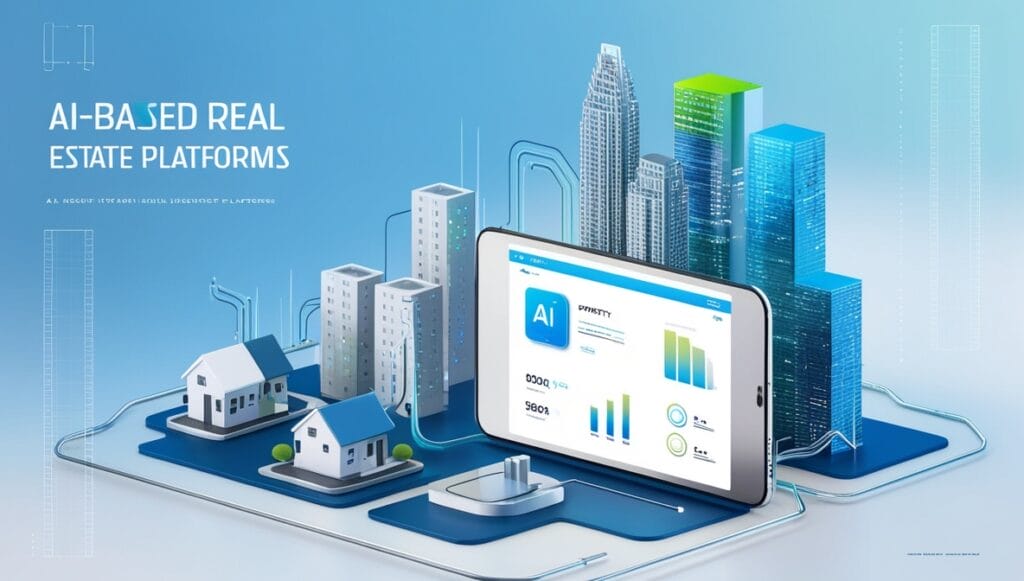Top 10 AI Solutions in the Real Estate Sector in Pakistan
Description

Top 10 AI Solutions in the Real Estate Sector in Pakistan
The integration of Artificial Intelligence (AI) in Pakistan’s real estate sector is ushering in a new era of efficiency, customer satisfaction, and informed decision-making. In a traditionally complex market characterized by lengthy processes and numerous stakeholders, AI technology offers innovative solutions that simplify and streamline property-related tasks. This transformation is evident in various facets of the industry, from property listings and market analysis to customer relationship management and investment strategies. AI-powered tools are enabling real estate professionals to analyze vast amounts of data quickly, providing insights that help buyers, sellers, and investors make more informed decisions.
For prospective buyers, AI-driven platforms offer personalized property recommendations by analyzing user preferences, budgets, and browsing behaviors. Virtual tours and interactive chatbots make property searching more engaging, eliminating the need for multiple site visits. For sellers, AI tools optimize listing visibility, leveraging predictive analytics to identify high-potential buyers, while property management systems automate maintenance scheduling and tenant inquiries.
Moreover, AI’s predictive capabilities enable investors to foresee market trends, helping them make strategic decisions about where and when to invest. In Pakistan, where the real estate sector has traditionally relied on human networks and manual processes, AI’s arrival marks a shift towards data-driven decision-making. As the industry adapts to these innovations, the sector is becoming more transparent, accessible, and responsive to the needs of modern buyers and sellers. This digital transformation is not only enhancing the customer experience but also strengthening Pakistan’s real estate market on a global scale, setting the stage for sustained growth and efficiency in the years to come.
Here’s a summary of the top 10 AI solutions currently making an impact:
1. AI-Driven Property Valuation

AI-driven property valuation tools, such as Zameen Valuator, are revolutionizing the real estate industry in Pakistan by offering data-driven, accurate property valuations. These tools analyze historical data, current market trends, location-specific factors, and even economic conditions to deliver precise property assessments. In a market where property values can fluctuate significantly, AI-based valuation systems ensure transparency and fairness in transactions, allowing both buyers and sellers to make informed decisions.
How AI-Powered Valuation Works
AI-powered valuation tools use advanced algorithms and machine learning to:
- Analyze Historical Data: AI tools pull in historical price data from similar properties in the area, providing a baseline for valuation.
- Assess Market Trends: Real-time and predictive market analysis allows these tools to account for market fluctuations, ensuring valuations reflect current trends.
- Evaluate Location-Specific Features: Factors like neighborhood development, proximity to amenities, and infrastructure quality are incorporated to give a holistic valuation.
- Adapt to Economic Conditions: By tracking economic indicators such as inflation rates and lending policies, AI tools can adjust valuations to align with the broader financial landscape.
Benefits of AI-Driven Property Valuation
- Reduction in Pricing Discrepancies
- AI valuation tools provide consistent and accurate pricing, reducing the chances of subjective or inflated valuations.
- Sellers can set realistic listing prices based on reliable data, leading to quicker sales.
- Buyers are safeguarded against overpaying, as valuations are based on an objective assessment of the property’s true market value.
- Enhanced Fairness in Transactions
- These tools create transparency by offering a clear breakdown of factors that influence the property’s valuation.
- Both parties in a transaction can feel confident about the fairness of the price, fostering trust and reducing the potential for disputes.
- Time and Cost Savings
- AI-driven tools simplify the valuation process, removing the need for time-consuming manual assessments by real estate agents.
- Faster valuations translate to quicker transactions, allowing buyers and sellers to move forward without delay.
- Informed Investment Decisions
- For investors, accurate property valuation tools are crucial for identifying undervalued properties with growth potential.
- Real-time insights and market analysis empower investors to make well-timed decisions that can optimize their returns.
- Scalability and Accessibility
- With online platforms, these AI valuation tools can reach a broader audience across Pakistan, including remote areas.
- This accessibility promotes inclusivity in the real estate market, providing valuable data to individuals and businesses across the socioeconomic spectrum.
Role of AI-Driven Property Valuation in Pakistan’s Real Estate Transformation
Within the “Top 10 AI Solutions in the Real Estate Sector in Pakistan,” property valuation tools like Zameen Valuator play a pivotal role in reshaping the industry. By providing reliable, objective valuations, these tools are not only improving transactional fairness but also fostering a data-driven culture that modernizes Pakistan’s real estate sector. The adoption of AI-based property valuations is gradually leading to a more structured, efficient, and equitable market, empowering buyers, sellers, and investors alike to make more confident and informed decisions.
2-Virtual Property Tours:

AI-powered Virtual Reality (VR) property tours are changing the way buyers engage with the real estate market in Pakistan, offering immersive, 360-degree experiences of properties without requiring in-person visits. In a country where traffic, geographical distance, and tight schedules can be barriers to property viewings, virtual tours offer a game-changing solution. This tool is especially relevant as the real estate sector in Pakistan looks to adopt innovative, customer-friendly solutions that make property viewing accessible, cost-effective, and enjoyable for both local and international buyers.
How AI-Powered Virtual Tours Work
These VR tours utilize AI-driven software that stitches together high-quality images and videos of the property, enabling a realistic, interactive experience for potential buyers. Key technologies include:
- 360-Degree Panoramic Imaging: AI processes high-definition images to create a virtual walkthrough, allowing viewers to explore each room and area of the property as if they were physically there.
- AI-Enhanced Detailing: Virtual tours provide detailed, close-up views of property elements, such as fixtures, finishes, and architectural design, giving buyers a clear picture of quality.
- Interactive Navigation: Users can navigate the property at their own pace, exploring different rooms and angles with ease, and sometimes even modifying elements like wall colors to envision potential changes.
- Compatibility with VR Headsets: Many virtual tours are compatible with VR headsets, creating an even more immersive experience that helps buyers visualize the space in 3D.
Benefits of AI-Powered Virtual Property Tours
- Time and Resource Efficiency
- Virtual tours save significant time for buyers by eliminating the need for multiple property visits, especially when viewing properties in different cities or regions.
- Sellers and agents can spend less time organizing and conducting in-person tours, leading to overall efficiency in the buying and selling process.
- Immersive and Engaging Experience
- The immersive nature of VR tours helps buyers connect with properties, making it easier to picture themselves in the space.
- AI-enabled virtual tours highlight property features effectively, enhancing buyer engagement and reducing the likelihood of misunderstandings or unmet expectations.
- Broadened Market Reach to International Buyers
- Virtual property tours break geographical barriers, allowing overseas Pakistanis and international investors to explore properties from afar.
- With access to realistic, high-quality virtual tours, foreign buyers can make decisions without needing to visit in person, increasing the potential for international real estate transactions.
- Minimizes Physical Visits, Reducing Health Risks
- In light of the ongoing importance of health safety, virtual tours provide a socially distant way to view properties, minimizing the need for face-to-face interactions.
- Buyers can shortlist properties online before committing to physical visits, reducing exposure for all parties involved.
- Enhanced Decision-Making for Buyers
- Detailed virtual tours offer buyers a comprehensive understanding of the property layout, allowing them to make more informed decisions.
- Buyers can easily compare multiple properties without extensive travel, resulting in clearer decision-making and often quicker closings.
The Impact of Virtual Property Tours in Pakistan’s Real Estate Market
Among the “Top 10 AI Solutions in the Real Estate Sector in Pakistan,” virtual property tours hold a prominent place in reshaping buyer experiences. By integrating VR with AI capabilities, these tours make property viewing far more accessible, realistic, and engaging. Real estate platforms and agencies that utilize AI-driven virtual property tours are not only making the property search process easier but are also aligning with global trends, helping Pakistan’s real estate market become more appealing to both domestic and international investors. This technology not only reflects innovation but also exemplifies the sector’s commitment to meeting the demands of today’s tech-savvy consumers.
3-AI-Powered Chatbots

AI-powered chatbots are becoming essential tools in Pakistan’s real estate sector, with platforms like Graana and Lamudi leading the way in implementing these virtual assistants to streamline customer service. As more buyers, sellers, and investors turn to online platforms for property searches and information, the demand for efficient, responsive customer support has grown. AI chatbots address this need by providing instant, round-the-clock assistance, enhancing user experience while reducing workload for human agents.
How AI-Powered Chatbots Work
These chatbots leverage natural language processing (NLP) and machine learning to engage in real-time, personalized conversations with users. Key features include:
- 24/7 Availability: AI chatbots remain active day and night, ensuring that users can have their questions answered at any time.
- Instant Responses: By analyzing keywords and user intent, chatbots can respond instantly with relevant information, providing immediate assistance.
- Multilingual Capabilities: Many chatbots are equipped to respond in multiple languages, catering to Pakistan’s diverse linguistic landscape.
- Learning and Adaptability: AI chatbots improve over time, learning from interactions to refine their responses and anticipate common queries.
Benefits of AI-Powered Chatbots
- 24/7 Customer Support
- Chatbots offer seamless customer support around the clock, ensuring users can access information whenever they need it.
- The constant availability of AI chatbots builds trust and satisfaction, as customers know they can rely on support at any hour.
- Instant Responses to Queries
- Chatbots minimize wait times by providing immediate responses to frequently asked questions, from property listings to pricing details.
- The quick responses enhance user experience and make information gathering faster, enabling users to make decisions more efficiently.
- Improves Efficiency by Freeing Up Agents
- By handling routine inquiries, chatbots allow human agents to focus on complex tasks and personalized interactions that require human expertise.
- Real estate agents can direct their attention to property showings, client consultations, and closing deals, improving overall productivity.
- Personalized Assistance for Users
- AI chatbots can deliver a tailored experience by analyzing user preferences, such as preferred location, property type, and budget.
- This personalization streamlines the search process for users, helping them find relevant listings faster.
- Scalability for Real Estate Platforms
- Chatbots can handle multiple queries simultaneously, making them highly scalable for high-traffic periods or platform growth.
- As demand increases, chatbots can be adjusted or expanded without requiring extensive staffing, making them a cost-effective solution.
- Lead Generation and Nurturing
- AI chatbots can gather user information, which is valuable for lead generation and customer profiling.
- By engaging users and gathering data, chatbots help real estate platforms identify potential leads and follow up with personalized services.
The Role of AI-Powered Chatbots in Pakistan’s Real Estate Transformation
AI-powered chatbots are a standout among the “Top 10 AI Solutions in the Real Estate Sector in Pakistan,” bringing speed, efficiency, and enhanced customer service to the industry. By automating repetitive tasks and improving response times, platforms like Graana and Lamudi are enhancing the user experience and ensuring their platforms are accessible and helpful to a broad range of users. As chatbot technology advances, these tools are set to play an increasingly crucial role in creating a responsive, customer-centered real estate environment in Pakistan, where users feel valued and supported throughout their property journey.
4-AI-Powered Market Trend Analysis

AI-powered tools for market trend analysis are transforming the way real estate investments are approached in Pakistan. By analyzing vast datasets and market signals, AI technology provides invaluable insights into future trends and property values. These tools are highly beneficial for investors, developers, and real estate professionals who rely on data-driven predictions to make informed decisions. AI-driven market analysis is particularly valuable in Pakistan’s rapidly evolving real estate sector, where understanding emerging trends and identifying high-growth areas is essential for staying competitive.
How AI Market Trend Analysis Works
AI market analysis tools use advanced machine learning algorithms and data analytics to examine both historical and real-time data, allowing them to identify trends and predict future property values. Key features of these tools include:
- Data Collection and Processing: AI systems gather and process large datasets, including property sales history, economic indicators, demographic trends, and urban development data.
- Pattern Recognition: Through machine learning, AI identifies patterns and correlations that indicate market trends, such as price increases in specific areas or growing demand for certain property types.
- Predictive Modeling: AI algorithms use predictive models to forecast future trends in property values and market conditions, helping investors plan long-term strategies.
- Risk Assessment: AI can assess potential risks in the market by analyzing variables such as economic stability, regional development plans, and infrastructural growth.
Benefits of AI-Powered Market Trend Analysis
- Informed Investment Decisions
- AI market analysis tools empower investors with precise, data-backed insights, allowing them to make strategic investment decisions.
- Access to accurate predictions on market direction helps investors avoid overvalued properties and capitalize on areas poised for growth.
- Identification of High-Growth Areas
- By analyzing multiple factors like upcoming infrastructure projects and urbanization rates, AI tools pinpoint neighborhoods or regions with high growth potential.
- Investors can identify “hot spots” early, giving them an advantage in securing properties that are likely to appreciate over time.
- Risk Identification and Mitigation
- AI tools offer risk assessment by evaluating factors that could impact market stability, such as political shifts, regulatory changes, and economic trends.
- Investors can anticipate potential risks and either adjust their strategies or avoid risky investments, ultimately minimizing financial exposure.
- Enhanced Decision-Making for Real Estate Developers
- Developers benefit from AI insights that reveal which property types are in demand, such as residential units, commercial spaces, or mixed-use developments.
- AI-driven forecasts enable developers to align projects with market demand, ensuring higher chances of successful sales and rentals.
- Optimized Portfolio Management
- For institutional investors or those managing extensive property portfolios, AI provides valuable metrics for optimizing asset allocation.
- Continuous monitoring and analysis help investors make adjustments to maximize returns based on market shifts.
- Greater Transparency and Investor Confidence
- AI-powered trend analysis brings transparency to the real estate market by making data accessible and interpretable for investors.
- With data-backed insights, investors gain confidence in their investments, supporting the growth of a stable and attractive real estate market.
The Influence of AI Market Trend Analysis on Pakistan’s Real Estate Sector
AI-driven market trend analysis ranks among the “Top 10 AI Solutions in the Real Estate Sector in Pakistan,” offering a powerful resource for both seasoned investors and new entrants. This technology enables stakeholders to navigate the complexities of Pakistan’s real estate market with greater accuracy and confidence, fostering a more informed investment environment. By reducing uncertainty and identifying profitable opportunities, AI-powered market trend analysis is reshaping the investment landscape, driving the growth and professionalization of Pakistan’s real estate sector.
5-Smart Property Management

Smart property management solutions, such as Proper.ai, are bringing efficiency and automation to property management in Pakistan. These AI-powered tools handle a variety of routine tasks, including rent collection, maintenance scheduling, tenant communication, and financial tracking. By automating these processes, smart property management platforms are transforming the property management experience, reducing manual workloads, improving tenant satisfaction, and ultimately leading to more profitable and efficiently managed properties. As Pakistan’s real estate sector grows, such solutions are proving essential for landlords, property managers, and real estate developers alike.
How Smart Property Management Solutions Work
AI-powered property management platforms employ automation, data analysis, and predictive modeling to optimize property management processes.:
- Automated Rent Collection: AI tools automate rent collection processes, sending reminders to tenants, tracking payments, and issuing receipts, which minimizes delays and ensures consistent cash flow.
- Maintenance Scheduling and Management: The system automatically schedules maintenance based on predefined intervals or tenant requests, and even sends alerts when issues arise.
- Tenant Communication: AI platforms can handle tenant inquiries through automated responses or chatbots, managing requests for maintenance, rent concerns, and property updates.
- Financial and Performance Analytics: These tools provide insights into operational costs, occupancy rates, and financial performance, allowing property managers to make data-driven decisions.
Benefits of Smart Property Management Solutions
- Increased Operational Efficiency
- Automating routine tasks such as rent collection, scheduling, and communication allows property managers to save significant time, enabling them to focus on more strategic aspects of management.
- By centralizing all management activities in one platform, smart property solutions eliminate manual paperwork, reducing administrative bottlenecks.
- Cost Savings in Property Management
- Automation reduces the need for additional administrative staff, which can result in substantial cost savings for property managers.
- Predictive maintenance scheduling helps property owners avoid costly repairs by proactively addressing minor issues before they escalate.
- Enhanced Tenant Satisfaction and Retention
- Fast responses to maintenance requests, automated rent reminders, and streamlined communication foster a positive tenant experience.
- High tenant satisfaction increases retention rates, reducing vacancies and improving property profitability.
- Data-Driven Decision Making
- Smart property management solutions provide valuable data and performance insights, enabling managers to make informed decisions regarding rent adjustments, maintenance budgets, and occupancy rates.
- Access to comprehensive analytics helps property owners identify cost-saving opportunities and potential areas for revenue growth.
- Improved Cash Flow and Financial Management
- Automated rent collection and tracking ensure timely payments, which is essential for maintaining steady cash flow.
- AI tools offer financial reports, helping property managers maintain transparency and easily monitor income, expenses, and profitability.
- Scalability for Managing Multiple Properties
- For landlords or property management companies overseeing multiple properties, AI-powered platforms allow them to efficiently scale operations without additional staffing.
- The ability to manage a large portfolio from a single platform simplifies operations, making it feasible to expand property holdings.
Impact of Smart Property Management on Pakistan’s Real Estate Market
Among the “Top 10 AI Solutions in the Real Estate Sector in Pakistan,” smart property management tools stand out as a crucial advancement in modernizing the sector. Solutions like Proper.ai offer property managers and owners the tools to operate more efficiently, reduce costs, and enhance the tenant experience, ultimately making property management a more structured and profitable process. As Pakistan’s real estate sector continues to grow, AI-powered smart property management will become an indispensable tool, enabling a higher standard of service and a more organized, data-driven approach to property management across the country.
6-Fraud Detection

Fraud detection powered by AI is becoming a cornerstone of security in Pakistan’s real estate industry, providing essential protection for buyers, sellers, and investors. Real estate transactions, which often involve large sums of money, are vulnerable to various types of fraud, including ownership disputes, document forgery, and financial irregularities. By leveraging advanced data analytics and machine learning algorithms, AI fraud detection tools can identify suspicious patterns, authenticate documents, and verify ownership, ensuring a more secure environment for property transactions.
How AI Fraud Detection Systems Work
AI-driven fraud detection systems utilize data analysis, pattern recognition, and anomaly detection to identify potential fraud in real estate transactions. These systems function by:
- Analyzing Transaction Data: AI tools analyze large volumes of transaction data, looking for anomalies that could indicate fraudulent activities, such as inconsistent payment patterns or unusual property valuations.
- Document Verification: AI systems cross-reference documents with official databases, checking for discrepancies and ensuring that titles, ownership records, and legal documents are authentic.
- Ownership Verification: By examining ownership histories and cross-verifying with government records, AI systems confirm the legitimacy of the property’s ownership chain.
- Anomaly Detection: Machine learning algorithms flag abnormal patterns, such as unusually high transaction values or duplicate documents, alerting stakeholders to potential red flags.
Benefits of AI-Powered Fraud Detection in Real Estate
- Enhanced Security in Property Transactions
- AI-driven fraud detection systems provide an additional layer of security, helping real estate professionals prevent scams and ensure transaction integrity.
- Detecting fraud at early stages reduces the risk of financial loss, protecting both buyers and sellers from potential harm.
- Authentication of Documents
- AI tools verify critical documents such as land titles, sales agreements, and property deeds, ensuring that only genuine and legally compliant paperwork is processed.
- By detecting forged or tampered documents, these systems prevent fraudulent claims and legal complications.
- Verification of Ownership and Transaction Legitimacy
- AI fraud detection systems validate ownership by tracing property histories and verifying records with relevant authorities, providing confidence to buyers regarding ownership rights.
- Confirming ownership history helps investors avoid properties with disputed titles or incomplete records, which can lead to lengthy legal battles.
- Protection Against Money Laundering
- AI tools flag suspicious transaction patterns that may indicate money laundering, ensuring that real estate transactions comply with anti-money laundering (AML) regulations.
- This function is crucial in maintaining compliance and safeguarding the industry against illegal financial activities.
- Efficiency in Fraud Detection and Prevention
- Automated fraud detection accelerates the identification of red flags, making it easier for real estate agencies and financial institutions to respond quickly.
- AI-powered systems save time and resources that would otherwise be spent on lengthy manual verification processes, contributing to faster, safer transactions.
- Building Trust and Transparency in the Market
- By ensuring secure and verified transactions, AI fraud detection tools foster greater trust among buyers, sellers, and investors.
- A transparent and fraud-resistant market attracts more investors, both local and international, enhancing the overall growth and stability of Pakistan’s real estate sector.
The Role of AI Fraud Detection in Pakistan’s Real Estate Sector
Fraud detection through AI technology is undoubtedly one of the “Top 10 AI Solutions in the Real Estate Sector in Pakistan,” as it directly addresses the need for transparency, security, and trust in high-value transactions. With AI’s ability to detect irregularities and verify documents, property transactions are becoming safer and more reliable. As Pakistan’s real estate industry evolves, the adoption of AI-powered fraud detection tools will be critical for safeguarding stakeholders and upholding the integrity of the market. This technology not only minimizes risks but also promotes confidence in Pakistan’s real estate market, establishing a secure environment for all participants.
7-Enhanced Mortgage Processing:

AI-driven mortgage processing solutions are revolutionizing how mortgages are handled in Pakistan’s real estate sector, making the financing process faster, more efficient, and accessible. In the traditional mortgage approval process, extensive paperwork, manual credit assessments, and property evaluations often result in lengthy delays, causing frustration for buyers. AI-enhanced mortgage solutions streamline this process by quickly assessing credit scores, evaluating property values, and automating document handling, thereby reducing approval times and enhancing the buyer experience.
How AI-Powered Mortgage Processing Works
AI in mortgage processing combines data analytics, machine learning, and automation to evaluate borrower profiles and assess properties swiftly. The process includes:
- Automated Credit Assessment: AI algorithms assess credit scores and financial profiles in real-time, analyzing data such as payment history, income, and financial obligations to make quick and accurate determinations.
- Instant Property Valuation: By analyzing market trends and historical data, AI can estimate property values instantly, making it easier to establish loan-to-value ratios and reduce reliance on lengthy appraisals.
- Document Processing and Verification: AI tools handle document verification, cross-referencing borrower data and supporting documents, such as income proof, directly from digital records and databases.
- Risk Assessment and Compliance: AI performs a comprehensive risk analysis, ensuring that mortgage applications meet lending criteria and regulatory compliance, minimizing potential risks for lenders.
Benefits of Enhanced Mortgage Processing with AI
- Accelerated Approval Process
- AI’s rapid data analysis and automation significantly reduce the time taken for mortgage approval, allowing buyers to receive decisions in days rather than weeks.
- Faster approvals make property purchases more straightforward, allowing buyers to act quickly in competitive markets.
- Improved Buyer Experience
- With fewer administrative delays and simpler document requirements, AI-enhanced mortgage processing offers a smoother, hassle-free experience for buyers.
- By streamlining the entire application process, AI reduces buyer stress and creates a more efficient, user-friendly financing process.
- Accurate Property Valuation for Informed Lending
- AI-based valuation models provide lenders with real-time, accurate property valuations, allowing them to make well-informed lending decisions.
- These tools reduce the risk of over- or underestimating property values, which benefits both lenders and borrowers by setting appropriate loan terms.
- Enhanced Risk Management for Lenders
- AI-powered tools assess borrower risk with precision, evaluating creditworthiness and property value to determine suitable loan options.
- This risk management capability reduces the chances of defaults, benefiting financial institutions and making lending safer overall.
- Increased Loan Approval Rates
- With AI-powered credit and property evaluations, lenders can provide tailored loan options that meet borrowers’ needs, which can improve loan approval rates.
- Buyers who may otherwise face rejection due to strict criteria have a better chance with AI-based assessments that consider a more comprehensive view of their financial standing.
- Cost Efficiency for Lenders and Borrowers
- Automating mortgage processes reduces overhead costs for lenders, savings that can translate into more favorable loan terms and lower fees for borrowers.
- The reduced need for manual processing and paperwork also enhances overall operational efficiency, benefiting all parties.
- Promotes Financial Inclusion
- AI-based assessments can provide access to financing for a broader segment of the population, including those who may not have traditional credit histories.
- AI can evaluate alternative credit data, allowing more people to qualify for mortgages and participate in the property market.
The Role of Enhanced Mortgage Processing in Pakistan’s Real Estate Growth
Enhanced mortgage processing is a vital component of the “Top 10 AI Solutions in the Real Estate Sector in Pakistan,” as it directly impacts the ease and speed with which buyers can secure financing. By using AI to streamline the mortgage process, real estate platforms, banks, and lending institutions are making property ownership more accessible, contributing to the sector’s growth. As more Pakistanis gain access to mortgage solutions through AI technology, the real estate market will continue to thrive, with faster transactions, reduced costs, and improved buyer satisfaction leading to an increasingly robust and inclusive property sector.
8-Image Recognition Technology

Image recognition technology is transforming how users search for properties in Pakistan’s real estate sector. By allowing users to upload images of desired property styles or features, AI algorithms can analyze these images and match them with similar listings. This innovative technology provides a visual-based search experience, enabling users to find properties that align with their preferences in a quick, intuitive way. This AI-driven approach not only saves time but also enhances accuracy, offering a more personalized property search process.
How AI Image Recognition Technology Works
AI-powered image recognition tools use advanced visual analysis and pattern-matching techniques to find properties based on user-uploaded images. The process includes:
- Image Analysis: AI systems analyze uploaded images, identifying specific visual elements such as architectural styles, interior layouts, colors, and materials.
- Pattern Matching: The system compares these elements with a vast database of property images, locating listings with similar visual characteristics.
- Preference-Based Filtering: Users can apply additional filters (such as location, budget, and amenities) alongside image-based search criteria for more precise results.
- Continuous Learning: Over time, AI models learn from user interactions and feedback, improving their ability to recognize and match preferences accurately.
Benefits of Image Recognition Technology in Real Estate
- Simplified Property Search Process
- Image recognition provides a direct way for users to find properties matching their ideal aesthetic without needing to describe specific features.
- Visual searches reduce the time spent scrolling through listings, simplifying the entire search experience and making it easier for users to find what they’re looking for.
- Accurate Matching with User Preferences
- By analyzing the visual components of user-uploaded images, AI technology can match properties with higher accuracy based on design, style, and layout preferences.
- Users get personalized search results, increasing the likelihood of finding properties that meet their specific tastes and needs.
- Increased Accessibility for Non-Local Buyers
- International buyers or remote investors can use image recognition to identify properties that align with their preferences without needing to describe features in detail.
- Visual searches allow non-local buyers to access a curated list of properties, making cross-border property investment more convenient and appealing.
- Enhanced Real Estate Platform Engagement
- Platforms that offer image recognition as a feature see increased user engagement, as users enjoy a more interactive, visual way to search.
- This unique functionality sets platforms apart in a competitive market, making them more attractive to tech-savvy users.
- Elimination of Language Barriers
- Image-based search bypasses the need for descriptive text, which is especially helpful in multilingual markets like Pakistan where users may prefer a non-verbal search approach.
- Image recognition enables people from various linguistic backgrounds to navigate the property market with ease, as searches are based purely on visual input.
- Improved Targeted Marketing for Real Estate Platforms
- By analyzing which types of properties users are visually drawn to, real estate platforms can offer more tailored property recommendations.
- AI learns user preferences, enabling platforms to send personalized notifications when similar properties become available.
- Efficient Data Utilization for Property Owners and Agents
- Property owners and agents benefit from the platform’s ability to bring attention to properties that match popular visual styles and trends, enhancing listing visibility.
- Image recognition technology allows agents to showcase properties with features that align with market demand, helping them reach interested buyers more efficiently.
The Impact of Image Recognition on Pakistan’s Real Estate Market
Image recognition technology is firmly established as one of the “Top 10 AI Solutions in the Real Estate Sector in Pakistan,” as it transforms how properties are searched, discovered, and ultimately chosen. This visual-based approach provides a simplified, accurate, and user-centric search experience that aligns with the preferences of modern property seekers. By leveraging image recognition, real estate platforms in Pakistan offer a more dynamic, accessible, and enjoyable property search experience, driving increased user engagement and satisfaction in a competitive market. As this technology continues to develop, it is expected to play an integral role in advancing Pakistan’s real estate sector, making property discovery easier and more intuitive than ever before.
9-AI-Based Real Estate Platforms

AI-based real estate platforms, like Urban Artificial Intelligence, are redefining Pakistan’s real estate industry by offering integrated services through a single, user-friendly interface. These platforms combine various aspects of real estate, from property searches and market analysis to customer support and mortgage assistance, creating a one-stop solution for buyers, sellers, and agents alike. By leveraging AI for everything from personalized recommendations to predictive market insights, these platforms deliver a streamlined, data-driven experience that simplifies real estate transactions and maximizes convenience.
How AI-Based Real Estate Platforms Work
AI-powered platforms centralize multiple real estate functions into a cohesive digital environment, making it easy for users to access and utilize various services without switching between applications. Key functionalities include:
- Property Listings and Image Recognition: AI enables advanced search capabilities, including image recognition, so users can find properties based on visual input, style, or specific features.
- Market Analysis and Valuation Tools: AI algorithms assess property values, trends, and potential investments, providing users with data-backed market insights for informed decision-making.
- Automated Customer Support: Many platforms integrate AI chatbots to answer user queries, provide support 24/7, and guide users through complex processes, such as loan applications and documentation.
- Personalized Recommendations: Machine learning models analyze user preferences and past interactions to recommend properties that align with their tastes and needs.
- Mortgage and Financial Services Integration: Some platforms also integrate mortgage processing and financial calculators, enabling users to explore financing options directly within the interface.
Benefits of AI-Based Real Estate Platforms
- Centralized Access to Real Estate Services
- With services like property listings, valuation, market analysis, and customer support available in one place, users benefit from a seamless, all-inclusive real estate experience.
- Users save time and avoid the hassle of switching between multiple platforms, as everything they need is readily accessible on a single interface.
- Enhanced User Experience
- An intuitive, centralized platform provides a streamlined experience, making it easy for users to navigate the real estate market and find what they need without delays.
- AI-enhanced user interfaces offer tailored experiences, showing users properties, data, and services most relevant to them.
- Data-Driven Market Insights
- AI-based platforms offer real-time market analysis, property valuations, and trend forecasts, enabling users to make informed decisions based on current market conditions.
- Access to accurate, real-time data reduces uncertainty for buyers and sellers, making the process more transparent and secure.
- Personalized Property Recommendations
- By analyzing user preferences and browsing history, AI-driven platforms recommend properties that align with individual tastes, increasing the relevance of search results.
- Personalized recommendations simplify the search process, helping users quickly identify properties that meet their requirements.
- Automated Customer Support and Assistance
- AI chatbots provide instant assistance, answering questions about property details, financing options, and documentation requirements, thereby improving user satisfaction.
- Automated support reduces the workload on agents and provides users with quick responses, enhancing the overall customer experience.
- Integrated Financial and Mortgage Solutions
- With built-in mortgage calculators and access to financing options, users can evaluate their budget, explore loan options, and get mortgage approvals directly on the platform.
- This integrated approach simplifies the financing process, making it easier for buyers to proceed with their property purchases.
- Cost and Time Efficiency
- AI-based platforms eliminate the need for multiple service providers, allowing users to complete their transactions faster and more cost-effectively.
- Centralized services also benefit agents and developers by providing a streamlined digital environment to manage listings, leads, and market analysis in one place.
- Improved Transparency and Trust
- These platforms foster transparency by offering up-to-date, verified information on properties and market trends, increasing user trust and confidence in their real estate transactions.
- By providing data and customer support at every step, AI-based platforms ensure that users have a complete understanding of the transaction process.
The Role of AI-Based Real Estate Platforms in Pakistan’s Market
AI-based real estate platforms are among the “Top 10 AI Solutions in the Real Estate Sector in Pakistan,” as they address the industry’s need for efficiency, transparency, and convenience. By centralizing various services and offering a data-driven, user-centric approach, these platforms are making real estate transactions simpler and more accessible for a diverse user base. As Pakistan’s real estate sector grows, the adoption of AI-based platforms is essential for supporting a modernized, competitive, and customer-oriented market, ultimately driving greater engagement, satisfaction, and innovation within the industry.
10-Smart Building Solutions:
Smart building solutions powered by AI are revolutionizing how buildings are managed and operated in Pakistan’s real estate sector. These AI technologies utilize data from sensors, IoT devices, and automation systems to monitor and optimize various building operations, such as energy consumption, temperature control, security, and maintenance. By automating key processes and using data to predict issues before they occur, smart building solutions enhance energy efficiency, reduce operational costs, and improve tenant satisfaction. As AI continues to advance, these systems are expected to play a pivotal role in making buildings more sustainable, cost-effective, and comfortable for tenants.
How Smart Building Solutions Work
AI-driven smart building systems gather and analyze real-time data from various sources within the building, using this information to make intelligent decisions that optimize building operations. Key components include:
- Energy Management: AI systems monitor energy usage, controlling heating, ventilation, and air conditioning (HVAC) systems to optimize energy consumption based on occupancy patterns, weather conditions, and user preferences.
- Predictive Maintenance: By analyzing sensor data, AI can predict when equipment or systems are likely to fail, scheduling preventive maintenance to avoid costly repairs and downtime.
- Security and Access Control: AI-driven security systems use facial recognition, smart locks, and cameras to monitor and manage building security, ensuring that only authorized individuals have access to certain areas.
- Lighting Control: AI systems control lighting, adjusting it based on occupancy and daylight levels to reduce energy usage while maintaining optimal illumination.
- Tenant Experience Management: Smart systems can also monitor and respond to tenant needs, such as adjusting room temperatures, providing digital concierge services, or even notifying management about tenant complaints or requests.
Benefits of Smart Building Solutions
- Improved Energy Efficiency
- AI technologies optimize energy consumption by controlling systems like HVAC and lighting based on real-time data and predictive analytics, reducing unnecessary energy use.
- Building owners and managers can lower their utility costs and contribute to sustainability by minimizing energy waste, helping them meet environmental goals and regulations.
- Reduced Operational Costs
- Predictive maintenance features allow smart buildings to detect potential issues before they become costly problems, reducing the need for emergency repairs and extending the lifespan of equipment.
- Automating routine tasks, such as lighting adjustments and temperature regulation, minimizes the need for manual intervention, saving time and labor costs.
- Enhanced Tenant Satisfaction
- AI-based systems create a more comfortable and responsive environment for tenants by adjusting temperature, lighting, and other systems based on personal preferences or usage patterns.
- Tenants benefit from seamless experiences, such as access control via smartphones, automated maintenance requests, and personalized comfort settings, which improve overall satisfaction and retention.
- Optimized Building Operations
- AI monitors and adjusts multiple building systems in real-time, ensuring that everything is operating at peak efficiency.
- With AI providing actionable insights on energy usage, equipment status, and building performance, property managers can make informed decisions that enhance overall operations.
- Sustainability and Environmental Impact
- By reducing energy consumption and waste, AI-driven smart building solutions help reduce the carbon footprint of buildings, contributing to more sustainable urban development.
- Building owners and developers who adopt these technologies are able to meet the growing demand for environmentally friendly and energy-efficient spaces, which are increasingly important to tenants and investors.
- Real-Time Monitoring and Control
- AI systems provide real-time data on building operations, enabling property managers and owners to make instant adjustments when necessary, improving operational flexibility.
- This level of monitoring ensures that issues are detected and addressed quickly, preventing minor problems from escalating into major disruptions.
- Data-Driven Decision Making
- The vast amount of data generated by AI technologies can be used to analyze building performance trends, helping property managers make informed decisions regarding renovations, upgrades, and investments.
- Data-driven insights lead to better planning and long-term cost savings by identifying inefficiencies or underutilized resources.
- Increased Property Value
- Buildings equipped with smart systems are often more attractive to both tenants and investors due to their energy efficiency, modern amenities, and enhanced comfort levels.
- This can increase the property’s marketability and overall value, making it a more competitive and desirable asset in the real estate market.
The Role of Smart Building Solutions in Pakistan’s Real Estate Market
Smart building solutions are an integral part of the “Top 10 AI Solutions in the Real Estate Sector in Pakistan,” as they offer significant advantages for property owners, managers, and tenants. By integrating AI to automate and optimize building operations, these solutions improve energy efficiency, reduce operational costs, and enhance the tenant experience. With growing interest in sustainability and cost-efficiency in Pakistan’s real estate market, smart buildings are set to become a key driver of the sector’s evolution. As AI technology continues to advance, smart building solutions will play a central role in shaping the future of urban development and real estate in Pakistan.
Conclusion:
The integration of AI solutions into Pakistan’s real estate sector is fundamentally transforming the way properties are bought, sold, and managed. These innovative technologies are improving efficiency, transparency, and customer satisfaction across various aspects of the industry, from property valuation and search to transaction processing and property management. The “Top 10 AI Solutions in the Real Estate Sector in Pakistan” have demonstrated significant potential in enhancing the overall real estate experience for both buyers and sellers, as well as investors, agents, and property developers.
As AI technologies continue to evolve, they offer even greater opportunities for the real estate sector to improve operational efficiency, make data-driven decisions, and offer more personalized experiences for customers. The adoption of AI in smart building solutions, predictive market analysis, AI-powered chatbots, and other key areas is not just improving the current real estate landscape but also shaping the future of urban living and property investments in Pakistan.
For stakeholders in the real estate industry—whether developers, agents, or investors—it is essential to embrace these technological advancements to remain competitive in a rapidly changing market. The continued adoption of AI will undoubtedly drive the sector forward, enabling it to meet the demands of modern consumers while contributing to sustainable and efficient urban development.
FAQS:
1. How are AI-driven property valuation tools like Zameen Valuator improving accuracy in Pakistan’s real estate market?
AI-driven tools analyze historical data, market trends, and property specifics to provide accurate and unbiased property valuations, reducing pricing discrepancies.
2. What are the benefits of AI-powered virtual property tours for international buyers in Pakistan?
AI-powered virtual tours allow international buyers to explore properties remotely, saving time, enhancing engagement, and expanding their market reach.
3. How do AI chatbots enhance customer service in the real estate sector in Pakistan?
AI chatbots provide instant, 24/7 support, answer queries quickly, and streamline communication, improving overall customer satisfaction.
4. Can predictive analytics tools accurately forecast real estate market trends in Pakistan?
Yes, predictive analytics tools analyze data to forecast trends, helping investors and buyers make informed decisions based on potential market changes.
5. What role does AI play in smart property management for large-scale developments in Pakistan?
AI automates tasks like rent collection, maintenance scheduling, and energy management, increasing efficiency and reducing costs in large-scale property management.




